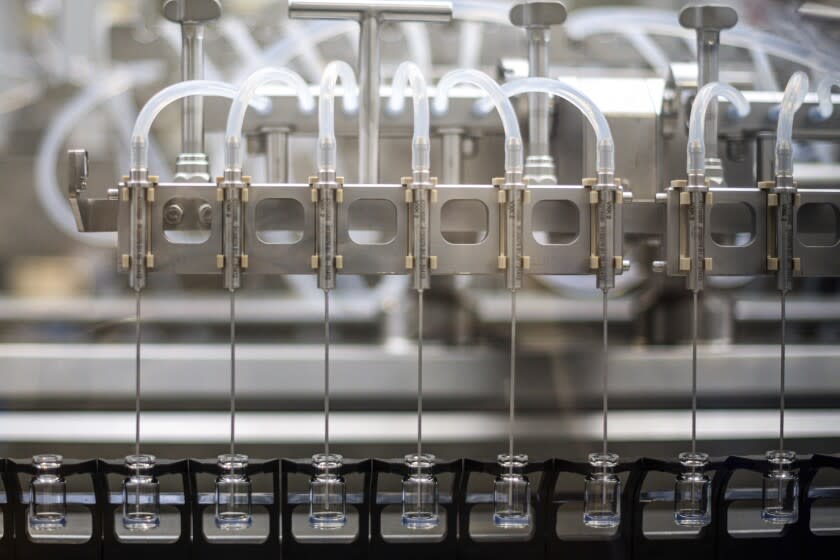Q&A: What parents should know about COVID-19 shots for the youngest children

The youngest Americans who have been waiting the longest to be vaccinated against COVID-19 may be just days away from a chance to roll up their sleeves.
An expert panel that advises the Centers for Disease Control and Prevention voted unanimously Saturday to recommend two new pediatric vaccines for children as young as 6 months.
If Dr. Rochelle Walensky, the CDC's director, follows their advice as expected, the vaccines will be available next week.
Members of the CDC's Advisory Committee on Immunization Practices urged parents to vaccinate their infants, toddlers and preschoolers.
“We’ve successfully immunized millions of children and adolescents to protect them from COVID-19," said committee member Dr. Yvonne Maldonado, an infectious-disease epidemiologist at Stanford University. "Families with infants and toddlers need and deserve the same chance to protect their children against this virus.”
A final signoff from the CDC would make roughly 18 million kids newly eligible for the shots.
Here are some things to know:
What kinds of vaccine are available?
Two brands — one from Pfizer and BioNTech, one from Moderna — received emergency use authorization Friday from the FDA. The vaccines use the same technology but are being offered at different dose sizes and number of shots for the youngest kids.
Pfizer’s vaccine is for children ages 6 months through 4 years. The dose is one-tenth of the adult dose, and three shots are needed. The first two are given three weeks apart, and the last at least two months later.
Moderna’s vaccine is two shots, each a quarter of its adult dose, given about four weeks apart for kids ages 6 months through 5 years. The FDA also approved a third dose, at least a month after the second shot, for kids with immune conditions that make them more vulnerable to serious illness.
How well do they work?
In studies, vaccinated youngsters developed levels of virus-fighting antibodies as strong as young adults, suggesting that the kid-size doses protect against coronavirus infections, especially severe ones.
However, exactly how well they work is hard to pin down, especially when it comes to the Pfizer vaccine.
Pfizer presented study information suggesting the company saw 80% vaccine efficacy with its three shots. But the Pfizer data were so limited — and based on such a small number of infections — that experts and federal officials say they don’t feel there is a reliable estimate yet.
Two doses of Moderna appeared to be only about 40% effective at preventing infections at a time when the Omicron variant was causing most COVID-19 illnesses.
Should my little one be vaccinated?
Yes, according to the CDC’s advisors. While COVID-19 has been the most dangerous for older adults, younger people — including young children — can also get very sick.
Hospitalizations surged during the Omicron wave. Since the start of the pandemic, about 480 children under age 5 have died of COVID-19, federal data show.
“It is worth vaccinating, even though the number of deaths are relatively rare, because these deaths are preventable through vaccination,” said Dr. Matthew Daley, a Kaiser Permanente Colorado researcher who sits on the advisory committee.
Which vaccine should my child get?
Either one, said Dr. Peter Marks, the FDA's vaccine chief.
“Whatever vaccine your healthcare provider, pediatrician has, that’s what I would give my child,’’ Marks said Friday.
The doses haven't been tested against each other, so experts say there’s no way to tell if one is better.
One consideration: It takes roughly three months to complete the Pfizer three-shot series, but just one month for Moderna's two shots. So families eager to get children protected quickly might want Moderna.
Who's giving the shots?
Pediatricians, other primary care physicians and children’s hospitals are planning to provide the vaccines. Limited drugstores will offer them for at least some of the under-5 group.
U.S. officials expect most shots to take place at pediatricians’ offices. Many parents may be more comfortable getting the vaccine for their kids at their regular doctor, White House COVID-19 coordinator Dr. Ashish Jha said. He predicted the pace of vaccination to be far slower than it was for older populations.
“We’re going see vaccinations ramp up over weeks and even potentially over a couple of months,” Jha said.
Can children get other vaccines at the same time?
It’s common for little kids to get more than one vaccine during a doctor’s visit.
In clinical trials testing the Moderna and Pfizer shots in infants and toddlers, other vaccinations were not given at the same time, so there are no data on potential side effects when that happens.
But problems have not been identified in older children or adults when COVID-19 shots and other vaccinations were given together, and the CDC is advising that it's safe for younger children as well.
What if my child recently had COVID-19?
About three-quarters of children of all ages are estimated to have been infected at some point. For older ages, the CDC has recommended vaccination anyway to lower the chances of reinfection.
Experts have noted re-infections among previously infected people and say the highest levels of protection occur in those who were both vaccinated and previously infected.
The CDC has said people may consider waiting about three months after an infection to be vaccinated.
AP reporter Zeke Miller in Washington contributed to this report.
This story originally appeared in Los Angeles Times.

